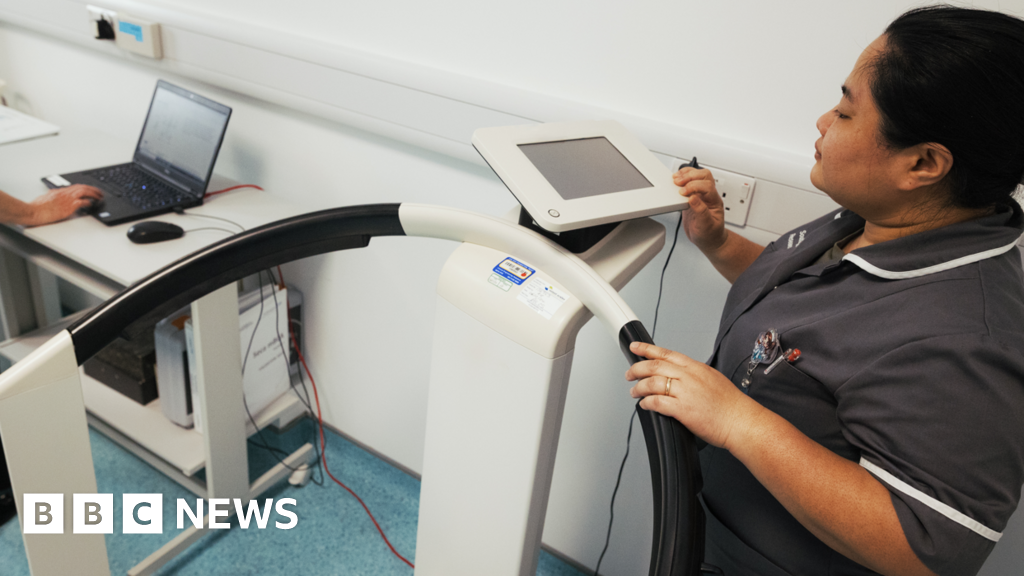This is an audio transcript of the Tech Tonic podcast episode: ‘Mission to Mars: The new space race’
Donald Trump voice clip
(Applause) Thank you. Thank you very much, everybody. Well, thank you very, very much.
Peggy Hollinger
On January 20th,…

This is an audio transcript of the Tech Tonic podcast episode: ‘Mission to Mars: The new space race’
Donald Trump voice clip
(Applause) Thank you. Thank you very much, everybody. Well, thank you very, very much.
Peggy Hollinger
On January 20th,…

Ethan Saundersin Blythe Bridge
 BBC
BBCA group of students are having an app developed to help break down the barriers around mental health for young people.
It comes after the teenagers, from Blythe Bridge High School in the Staffordshire Moorlands, won a competition put on by suicide prevention charity the Oli Leigh Trust.
Their app, Mindful Mondays, hopes to break down the barriers that young people face around their mental health.
Sophie Hodgkinson, who is 15 and one of the female students behind the idea, said: “A lot of people struggle with it silently and don’t feel like it’s ok to talk about it. There’s a lot of negative stigma around it.”
Tilly Hyatt, also in the team of six, felt it was better the idea came from young people as adults might not fully understand the pressures facing teenagers.
She said: “We know what causes the stress and how to help it.”
The app hopes to offer a safe space for students to talk anonymously about their mental health, while also giving them challenges to help improve it.
“It will build towards having the positive foundation, so people can be happier, focus better in school and help in small increments to have better mental health in the future,” said Anneliese Costain, another member of the team.

Kristopher Knight teaches science at the school and feels issues with mental health are one of the biggest problems facing schools.
He said: “We are seeing students not attending lessons and a lot of this is about a lack of provisions in and out of schools, because of external factors such as funding.”
“We are not professionals [when it comes to mental health], we are there to support students but our main priority is being in the classroom to teach them,” he added.
Asked about what he thought of the idea the girls had come up, with Mr Knight said he was proud of what they had achieved.
“Any support we can throw out to our students, and any small things they can do themselves or talk to parents about can only be a positive thing,” he added.
“I couldn’t think of anything better to champion than young people’s mental health.”

Pamela BilalovaNorth East and Cumbria
 Google
GoogleA former library will be turned into a community gym aiming to boost people’s mental health.
The empty building, on High Street in Stanley, County Durham,…

Under the agreement, Ovolo retains brand and operational control of the hotels whilst exclusively partnering with Wyndham for distribution and to pursue franchised growth opportunities throughout the Asia Pacific region. The five hotels – one in Hong Kong and four across Australia – will be integrated into Wyndham’s global sales, marketing and distribution platforms, including its 120 million-member Wyndham Rewards loyalty programme.
Hong Kong-based Ovolo is an independent hospitality company known for its innovation and disruption, owning and operating a collection of award-winning and individually designed lifestyle hotels and serviced apartments. Wyndham Hotels & Resorts is the world’s largest hotel franchising group by number of hotels, with over 9,200+ hotels in over 95 countries on 6 continents.
The cross-border WFW team that advised Ovolo was led by Sydney Hotels & Hospitality Partner Robert Williams, supported by Sydney Corporate and M&A Consultant Chris Greiner and Singapore Corporate Associate Meryl Tan.
Robert commented: “We are delighted to have supported Ovolo on this innovative and transformative transaction, which reflects the growing appetite for experiential travel and the increasing relevance of lifestyle brands in the global hospitality landscape. This transaction highlights the focus even the biggest global players have on genuine lifestyle brands and platforms, and WFW’s continued commitment to supporting hospitality entrepreneurs and ventures break the mould across the Asia Pacific region and beyond”.

Lynette HorsburghNorth West
 Paul Sudbury
Paul SudburyA group of friends who spent their childhoods in the 1970s making mini-movies reunited to complete one of them 47 years later.
Paul…

Jamie CoulsonYorkshire health correspondent
 BBC
BBCA Grand National-winning jockey has spoken about the importance of keeping a sense of hope, after a horrific fall left him…

The Financial Services Regulatory Authority (FSRA) of Abu Dhabi Global Market (ADGM) has released Consultation Paper No. 10 of 2025, introducing a dedicated regulatory framework for the staking of virtual assets. This proposal marks a significant evolution in ADGM’s approach, transitioning from initial recognition of staking to the establishment of a formal regulatory perimeter around such activities. By focusing on staking, the FSRA aims to enhance ADGM’s position as a forward-looking jurisdiction for digital asset innovation, while ensuring robust oversight of emerging virtual asset functions.
In December 2024, the FSRA signalled its intent to regulate staking by raising key questions around the associated risks in its consultation papers. These initial papers concentrated on foundational issues, such as defining operational models for staking businesses. However, they did not address broader regulatory considerations; specifically, the principles that trigger oversight and the obligations placed on authorised persons conducting staking activities.
Consultation Paper No. 10 of 2025 seeks to close these gaps by proposing a set of regulatory triggers and requirements for entities that stake virtual assets on behalf of their clients.
Under the proposals, regulatory oversight is triggered when staking activities involve accepted virtual assets within the scope of regulated operations. Authorised Persons who hold or control virtual assets for the purpose of staking are required to obtain a Financial Services Permission for either custody or managing assets. Virtual Asset Custodians may only stake client assets upon receiving explicit instructions from the client. If such custodians intend to exercise discretion in staking decisions, they must secure a Financial Services Permission for managing assets. Conversely, Virtual Asset Managers are permitted to stake client virtual assets on a discretionary basis, provided they are responsible for selecting appropriate staking opportunities and ancillary service providers.
The proposed framework draws clear boundaries around what falls outside the scope of regulatory oversight. Solo staking remains unregulated, as participants act solely on their own account without any form of intermediation. Service providers that deliver technical infrastructure to support staking are also excluded, provided they do not hold or control virtual assets. Additionally, the regime does not extend to other yield-generating activities such as liquidity mining, yield farming, or the issuance of liquid staking tokens which are also typically referred to as staking. Its focus is strictly limited to arrangements involving participation in blockchain validation under a proof-of-stake consensus mechanism.
The proposal also sets out a series of regulatory obligations for authorised persons engaging in staking activities involving client virtual assets. These entities must:
This paper signals a turning point in how staking is treated under regulatory frameworks. It’s a prime opportunity for firms to align early with supervisory expectations and shape compliant, scalable staking models before the market matures.
It is imperative that clients closely review the supporting guidance to be issued by the FSRA on implementation of this proposal, as it will clarify critical nuances in regulatory oversight. In particular, forthcoming guidance on staking-specific disclosures will be essential for ensuring compliance and shaping operational responses. Understanding these details will help entities navigate the framework in the future.
At present, clients should begin by evaluating whether they meet any of the regulatory thresholds outlined in the framework. From a commercial standpoint, firms engaged in or planning to engage in these activities will find new opportunities emerging. However, a clear understanding of their eventual obligations to the FSRA will be essential to ensure full compliance and avoid regulatory pitfalls.
ADGM’s updated regulatory framework signals a broader shift toward functional regulation; focusing on what digital assets do, rather than simply what they are. With the inclusion of specific staking activities under its oversight, the FSRA is reinforcing ADGM’s position as a forward-looking jurisdiction committed to shaping the future of the digital asset ecosystem.
Our team is advising clients across sectors on regulatory compliance, infrastructure, and risks. If you would like to discuss how these proposed reforms could affect your business or how to turn regulatory change into competitive edge please get in touch with Tom Bicknell or Barkha Doshi.

A university has been awarded £1.2m to carry out pioneering research into how body composition could improve breast cancer treatments.
The University of Southampton will partner with eight NHS trusts on the programme, paid for by The World Cancer…

In a breakthrough that connects modern science with ideas first explored a century ago, researchers have witnessed a surprising phenomenon once thought possible only in inorganic metal oxides appearing inside a glowing organic semiconductor…